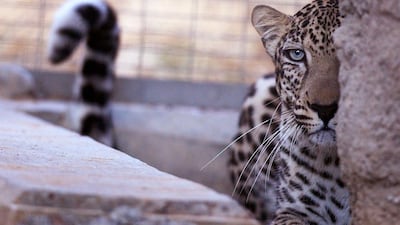ABU DHABI // A leading veterinarian has warned that keeping exotic animals as pets at home runs the risk of serious injury not only to the animal but also to people, especially young children.
Dr Yahya Elnoush, a veterinarian at Animal Welfare Al Ain, said it is dangerous to keep wild animals such as big cats at home, saying the unfamiliar habitat is likely to make the animal lash out.
“How any one can expect a wild animal, who is only familiar with jungle life, to live happily in the city house?” said Dr Elnoush.
“They will either eventually run away or harm any family members.”
Dr Elnoush recalled an incident that happened in Al Ain last year when one big cat ran away from its owner’s house and was found hours later roaming the city.
“It created a chaos in the city. Everyone panicked,” he said.
“Eventually authorities had to rescue the animal and kept him in the zoo. The animal died the next day. It must have been sick.”
Debbie Spalton, from the UAE-based Middle East Animal Foundation, said there were no licences being issued in the country permitting keeping endangered animals for “personal use”.
“There are laws which can punish people for keeping these animals as pets. But it’s not really clear how often they are enforced,” she said.
The trade in wild animals is regulated by Cites, the Convention on International Trade in Endangered Species of Wild Fauna and Flora, which has procedures in place to protect rare species. The UAE is a signatory to the convention, which means rare animals may be traded only with appropriate paperwork.
Ms Spalton said that some websites in the UAE advertised rare and endangered animals for sale. The UAE is at the centre of global trade in cheetahs, in particular, and there is genuine international concern about it.
“We find it very frustrating that there doesn’t seem to be the will to make a concerted effort against this practice,” said Ms Spalton.
According to the law, those who illegally buy or sell endangered animals in the UAE, if caught, will face a fine of between Dh10,000 to Dh50,000 and a prison term of six months. The animals will also be confiscated.
“If it was found that the animal was being ill treated, the person may face even tougher punishments because the charges will no longer be just trading but also abusing animals,” said Yousef Al Bahar, an Emirati lawyer.
He explained that the trade of exotic wildlife must be supervised by the Ministry of Water and Environment, which decides the approval or rejection of the process.
“If the ministry approves it will provide the buyer with a permit. However things do not end here, he has to provide all necessary care to this animal and the ministry makes sure that this care is being provided through inspections,” he said.
Maha Oda, campaign officer at International Fund for Animal Welfare (IFAW) UAE says her organisation recently launched a campaign in collaboration with the Ministry of Education to teach children about the dangers of keeping wildlife as pets. “Belong to the Wild educated more than 30,000 students from Grade 4 and 5 about the danger of keeping wild animals as pets and why these species belong to the wild,” she said. “The students learnt about the negative consequences of keeping wild animals, health and safety, as well as the danger poaching poses to conservation, environment and animal welfare.”
She says the IFAW is committed to raising awareness about animal welfare and conservation.
akhaishgi@thenational.ae
* with additional reporting by Salam Al Amir and Martin Croucher

